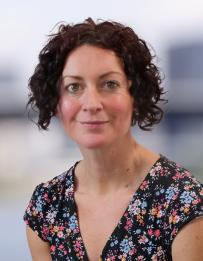Meet Jenny Wright
Newcastle, England, U.K.

Goals. Teamwork. Quarters. Pressure. Pep talks.
The field of sports and the world of business have more in common than you might think. That’s why someone like Jenny Wright—an elite athlete and high-level coach—thrives just as easily in corporate boardrooms as on hockey fields.
Jenny is an evolution director specializing in strategic organizational transformation and building high-performing, integrated teams. Whether she’s driving behavioral change in infrastructure programs or representing Wales on the masters hockey field, she leads with purpose, resilience and collaboration.
Her superpowers? Creating strong, collaborative work cultures, advancing innovative ways of working and building the governance needed for major, complex projects.
Get to know Jenny
-
94 %
of women in C-suite positions have played sports
-
3
years with Jacobs
-
2000
employees impacted by her largest transformation effort
-
16
caps playing masters hockey for Wales
-
15
years spent in sports coaching
-
2
dogs: Whisper and Tonks
What are the biggest challenges in organizational transformation?
- Lack of a clear vision. Many organizations don’t know what they’re aiming for or why they need to change. They need strategic thinking, gap analysis and a solid future-state vision to guide them.
- Limited preparation and resources. Change doesn’t happen without a plan. Organizations need phased, realistic strategies with specific targets for performance, leadership, communication and engagement. Dedicated people and resources are key.
- Unrealistic expectations. Big ambitions are great, but without patience and persistence, momentum fades. A successful transformation requires consistent effort, flexible leadership and a commitment to long-term goals—especially when challenges arise.
How does your transformational work help clients?
I create space for leaders to think differently. I help them define their vision and outcomes, assess where they are today and chart a realistic path forward. This includes:
- Establishing a baseline (structure, culture, leadership, ways of working)
- Conducting a gap analysis
- Developing a theory of change with performance indicators
Alongside this, I focus on leadership development and coaching to build long-term transformation capability within their teams.
What's your favorite part of your role?
Meeting incredible people across major infrastructure programs, especially in the water sector. Collaborating to shape the future is both challenging and rewarding, and seeing people shift their mindset is one of the most inspiring parts of the job.
What are the business lessons from your high-level sporting career?
Teamwork is everything. I encourage a “squad mentality” where everyone knows their role, supports each other and works toward a shared purpose. High-performing teams need aligned goals and a culture that prioritizes what’s best for the program.
Resilience is key. When things don’t go to plan, it’s important to stay focused on the outcome and adapt. Just like on the field, preparation builds adaptability. Training builds confidence and enables adaptability: train hard, play easy! When the pressure’s on, a prepared team has a much better chance of winning.
What frameworks do you use in your work?
One of my favorites is Project 13, which supports major infrastructure programs through enterprise collaboration models. While there’s no perfect framework, I blend several methods—including alliancing and custom models—to align with each client’s transformation goals.
It all starts with understanding what drives the client and where they want to go.
When you’re not at work, what can we find you doing?
Hockey is a lifelong passion—I’ve played since primary school and missed only three seasons (twice for maternity leave and once for a knee injury). That injury taught me a lot about resilience.
I also love walking with my two dogs and family in the Cumbrian mountains, especially in the Lake District. And I’m always up for a sunny holiday!












































